Process Intelligence: What Is It? And Why It Matters for RPA

How Process Intelligence Can Improve Your Intelligent Automation Journey
For your intelligent automation (IA) journey to reach its full potential, your organization should have complete process visibility. Gaining complete visibility of your business operations can be challenging, taking intense manual effort by analysts and your Center of Excellence (CoE) teams.
So, how can you move from a limited process discovery tool and manual documentation to understanding all the right processes to automate for a total digital transformation?
Process intelligence lets you analyze multiple processes within your business to deliver a digital process model of your operations. It creates a visual model so you can identify deviations and find the root cause of problems that may be costing your organization time and money. Process intelligence helps you improve processes end-to-end, regardless of complexity, with its ability to extract data from almost any system, including legacy systems. This big-picture approach gives you the applications to understand how your processes work, where they can improve and how to optimize them to increase your organization’s return on investment (ROI).
Your analysts and CoE team can use process data management tools to gain full visibility into how processes function. This helps them identify which processes to automate and which to optimize.
What is process intelligence?
Process intelligence connects the best aspects of process mining, task mining and business intelligence. It allows you to identify and edit process functions through discovery, analysis and process optimization. Process intelligence helps you scale your automation faster by identifying inefficiencies and running applications at peak process performance.
Process Intelligence vs traditional process discovery
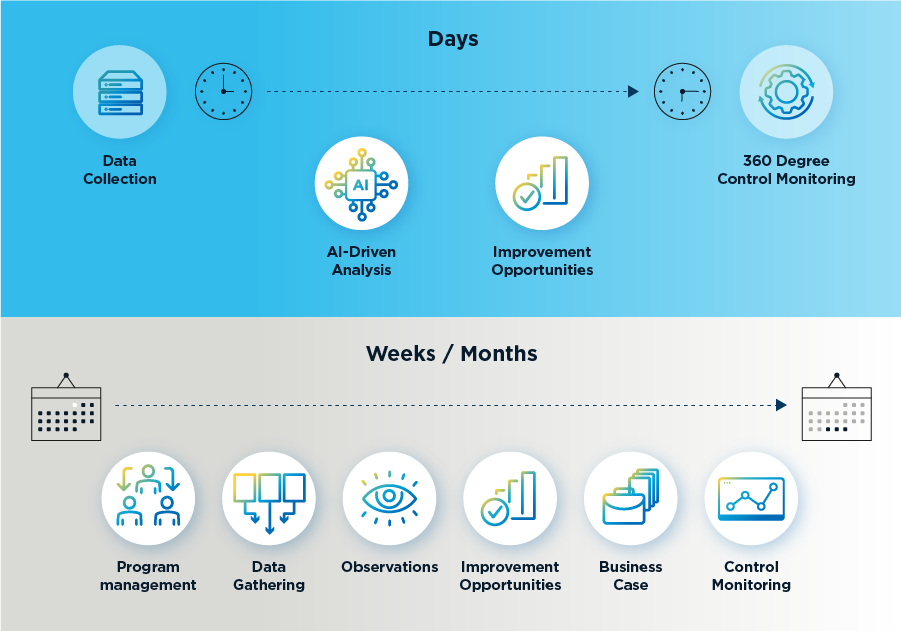
The legacy approach to process discovery requires a manual model drawing to analyze how processes are performed and which have optimizing potential. This is not only time-consuming, but also lacks a complete understanding of end-to-end process execution. This can end in missed opportunities for a higher ROI.
Meanwhile, process intelligence combines the advanced capabilities of process mining, task mining and business intelligence monitoring to help you realize your organization’s value faster. These process intelligence tools investigate every level of a workflow to find bottlenecks and dysfunctional processes. They extract this data and summarize it in a detailed process definition document (PDD) with detailed descriptions of end-to-end tasks.
Process intelligence allows users to define process rules aligning with an organization’s compliance requirements. This way, process owners are alerted of any deviations so the business can avoid potential risks.
"To succeed at automation, organizations, and automation teams must invest in technologies such as process mining and analytics to understand complex processes better and ascertain their suitability for automation.”
Forrester Getting Intelligent Automation Right
What is task mining?
Task mining allows an organization to capture process and user interactions, identify repetitive or time-consuming tasks and recommend any potential opportunity for automation to resolve these sticking points.
What is process mining?
Process mining software uses data from your systems to help you discover, monitor and improve real digital processes. It uses event log data to create accurate process models indicating how your processes are executed. It’s an ideal tool for analyzing processes retrospectively and making data-driven process decisions about your automation strategy.
What is the difference between Process Mining and Process Intelligence?
Some process mining tools may not be able to connect with certain types of data sources or may struggle with complex processes. Process mining is great at looking at real-world data to analyze processes retrospectively but doesn’t let you monitor current processes.
Process Intelligence combines process mining, task mining, and business intelligence-like metrics to provide deep insights into business processes. Its numerical deep-dive analysis works well on all types of processes, no matter how many data sources are involved or how complex a process may be.
Unlike other tools, Process Intelligence can monitor processes in real-time. This means that process owners can be alerted to errors and deviations, improving how the business operates.
What are the benefits of Process Intelligence for RPA and IA?
Implementing digital workers effectively requires preparation and planning. Developing an automation implementation strategy will help you realize your best business value. Process intelligence helps you make optimal use of your robotic process automation (RPA) and IA so your business goals stay a top priority.
Outcome-focused insights
Process intelligence provides valuable insights into an actual process, identifying where automation can deliver the best outcomes. Process intelligence uncovers delays, siloes or duplicates. It finds opportunities so you can optimize processes for both digital workers and people, helping to seamlessly unify your workforce.
Full visibility for understanding processes
You can visualize highly variable processes in different dimensions, or process definition documents (PDDs), to avoid missed opportunities. Process intelligence helps you find the optimal path to the highest efficiencies leading to the best ROI. In the design stage, it’s important to gather this intel so you can visualize the imperfections in your workflows. Using this data, you have the details to form an optimized strategy.
Accelerated automation journey
Process intelligence reduces the time for process discovery by helping you sift through processes to prioritize which should be automated first. This knowledge lets you accelerate each step of your automation. It also allows you to scale your automation faster so you can develop process automation in a matter of days.
Optimized processes
Process intelligence tools allow you to monitor end-to-end processes. With these insights into process performance, you can tweak your processes to optimize their operations. You can also monitor processes performed by employees and digital workers to ensure compliance and efficiency.
Automated governance and compliance
Based on a reliable, data-driven foundation, process intelligence defines and tracks processes aligning with compliance and governance goals. This helps you define rules to maintain standard protocols and ensure consistency.
Automations running at peak performance
Knowing which processes to automate for the greatest returns prepares you to run your RPA and IA at peak performance. The more details you have on any given process, the more information you have for refining it in the future.
“BPM is going to provide the ability to orchestrate beyond what just human workers or automations could do, bringing them all together.”
Lou Bachenheimer, CTO Americas at SS&C Blue Prism
Default Intelligent Automation (IA)
Intelligent automation (IA) is the combination of multiple automation technologies. It includes business process management (BPM), robotic process automation (RPA) and artificial intelligence (AI). Together these technologies automate business processes to enable streamlined, scalable decision-making across an organization.
How SS&C Blue Prism’s Process Intelligence Works
Process intelligence easily integrates into each step of your business process lifecycle. It uses process mining, task mining and business intelligence capabilities to discover, automate and optimize your processes. There are so many real-world examples of process intelligence working for organizations to standardize output, provide accurate documentation, complete end-to-end transactions and execute back-office functions among many other processes. The insights provided by process intelligence will help you manage your automation and seek out new growth opportunities.
A 5-step guide for process intelligence
Rapidly compare people, processes and systems against best practices. Knowing the initial state of any process enables you to track process automation benefits with more precision.Establish Baseline
Rapidly compare people, processes, and systems against best practices. Knowing the initial state of any process enables you to track process automation benefits with more precision.
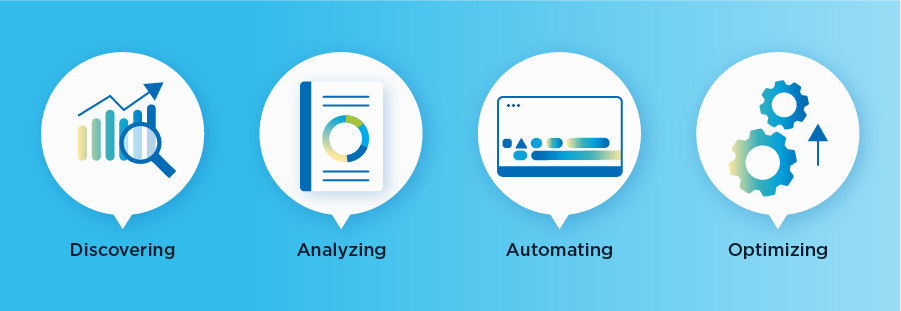
Discovery
In the discovery stage, process intelligence creates an unfiltered history of every process. It does this using task and process mining to extract data from systems and user interfaces. The data is then exported visually to show how processes are performed. The complete view of each process is displayed on a user-friendly dashboard.
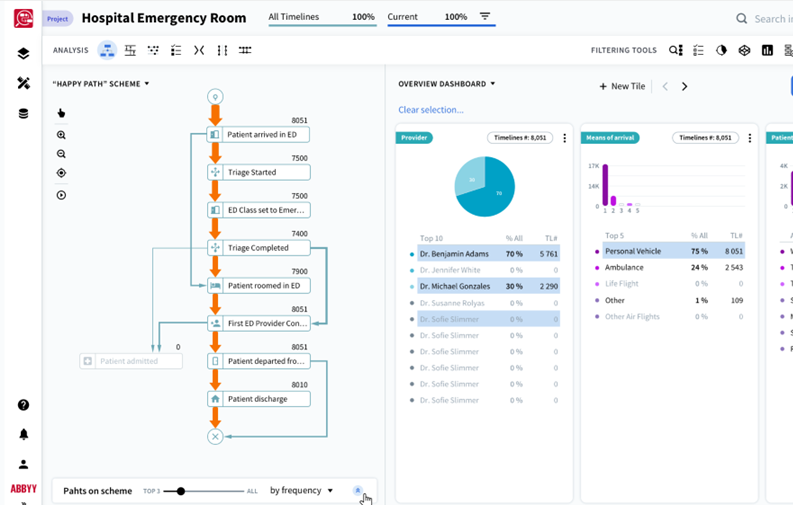
Analyze
On the dashboard, you can see the entire process steps, variations and bottlenecks. You can then use process modeling for a root cause analysis. It gives an overview of process variants and different possible outcomes. From there, you can feed the processes into machine learning (ML) tools that recommend a ‘happy path’. The happy path will identify ideal paths for automation. This helps guide you to deliver the best outcome from your processes – whether that’s in cost reduction, time savings or improved ROI. Learn more about business process analysis (BPA) for better automation.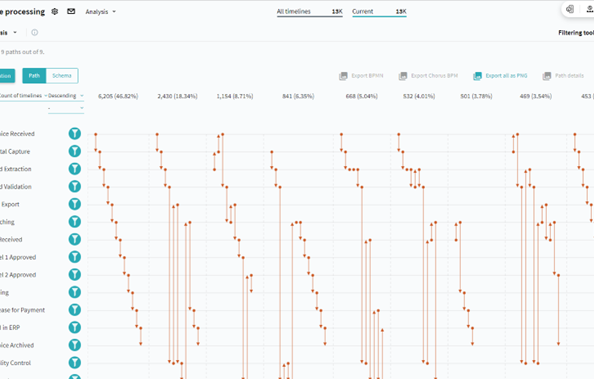
Automate
Once you’ve analyzed the processes, you can then decide on which processes to automate. Think about whether the process requires manual work, human-in-the-loop (HITL) – meaning it requires a person to set up, manage and test the models – or whether it’s suited to full automation. Just remember, you don't necessarily have to automate everything. This information is meant to help you decide where automation can best be optimized to help you automate wisely. Once you’ve picked processes to automate, you can export the process skeleton to the design studio to automate.
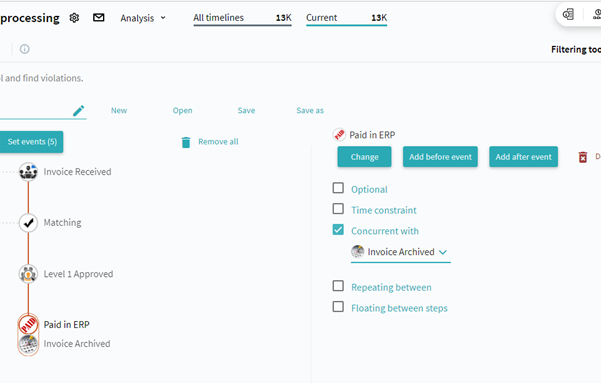
Optimize
Now that you’ve looked at which processes to automate, you can turn your attention to what to optimize. In any organization, processes can always be improved. Business process management (BPM) tools are perfectly placed to help turn documentation into actionable results. What’s more, by integrating BPM and process intelligence you can get your processes running at peak performance. With the right business process management tools, you know which processes to manage, modify or optimize. BPM then executes process modifications to help you stay compliant and run at the highest level of operational efficiency.


Now, let’s look at some process intelligence case studies.
Process Intelligence case studies
Process Intelligence in Financial Services
A financial services firm with over $1 trillion under management and more than 5 million clients needed to monitor the compliance of investor onboarding to mitigate regulatory risk. Previously, the firm could only monitor 15% of the processes. But by working with SS&C Blue Prism, the firm automated the identification and monitoring of 100% of its transactions. Their cost savings in the region were $2 million a year. For them, process intelligence reduced the risks of a compliance violation, exposure to fines and reputation damage.
Process Intelligence Healthcare
Canadian Healthcare Organization
A leading Canadian healthcare organization has big ambitions for its automation program. Their IA journey with SS&C Blue Prism began in January 2021. In the summer of 2022, the Canadian organization launched a process and task mining project. By April 2024, they expect their savings to exceed $4.7 million.
This Canadian healthcare organization plans to extend SS&C Blue Prism’s process intelligence into automated processes in finance, HR staff scheduling and IT. They predict this move will help improve employee experience, increase operational efficiency and productivity, elevate operational agility and reduce operational risk.
US Healthcare Provider
A U.S. healthcare provider was challenged with checking every patient’s insurance was verified before providing services. Yet the process of verifying all patient insurance before arrival exposed the healthcare provider to increased costs due to superfluous insurance verifications.
SS&C Blue Prism’s process intelligence identified four duplicate insurance verification checks per visit on average. This meant potential cost savings of $5.5 million a year just by automating the process. The worst offender ran 125 duplicate insurance verifications in one day.
“An instrumental part of delivering ... value to patients is ensuring that our business processes are streamlined, data-driven, and account for how people and bots interact with them. This is why we are excited to be working with Blue Prism and ABBYY to deliver comprehensive process intelligence to our automation opportunities.” Benjamin Berkowitz, Director of Intelligent Automation, Mass General Brigham |
Process Intelligence In Insurance
The Uniqa Insurance Group AG is one of the largest insurance groups in Austria and Central and Eastern Europe. They support approximately 10.5 million customers with insurance products and services. Uniqa has scaled its intelligent automation program to include 12 departments, 36 live processes and 200 thousand transactions.
Over the last year they’ve tried multiple process mining and task mining software tools. But they found many on the market requiring extensive data manipulation. In contrast, SS&C Blue Prism’s process intelligence (BPPI) made it easy to get the actionable insights they wanted. In BPPI’s dashboard, they used the predefined set of views and reports to significantly increase the speed of their results. BPPI covered their task and process mining capabilities in one integrated software.

"Companies that take a more strategic approach to IA unlock up to five times more business value than those simply focusing on ROI from automating individual tasks."
Knowledge Capital Partners
Process Intelligence: Key Takeaways
- Process intelligence is the key to identifying the best processes to automate and get the most out of RPA and IA.
- Process intelligence helps you discover, analyze, automate and optimize your processes faster.
- Process intelligence ensures that your processes are compliant and work at peak performance.
- Process intelligence can play a significant role in delivering elevated customer experiences and employee journeys.
- Process intelligence helps you scale faster and expand the scope of your automation.
Learn how easy it is to get started with Process Intelligence, with a Process Intelligence free 30-day trial that comes with a comprehensive starter kit.